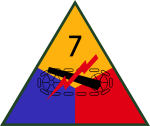7th Armored Division (United States)
| 7th Armored Division | |
|---|---|

7th Armored Division shoulder sleeve insignia
|
|
| Active | 1 March 1942–9 October 1945 1950–1953 |
| Country |
|
| Branch |
|
| Type | Armor |
| Role | Armored warfare |
| Size | Division |
| Nickname(s) | "Lucky Seventh" |
| Engagements | |
| U.S. Armored Divisions | |
|---|---|
| Previous | Next |
| 6th Armored Division (Inactive) | 8th Armored Division (Inactive) |
The 7th Armored Division ("Lucky Seventh") was an armored division of the United States Army that saw distinguished service on the Western Front, from August 1944 until May 1945, during World War II.
The division was activated on 1 March 1942, reorganized on 20 September 1943 and arrived in England in June 1944. Throughout most of its existence the 7th Armored Division was commanded by Major General Lindsay McDonald Silvester, an infantryman who had distinguished himself in World War I.
The 7th Armored Division landed on Omaha and Utah Beaches, 13–14 August 1944, and was assigned to U.S. Third Army, commanded by Lieutenant General George S. Patton. The division drove through Nogent-le-Rotrou in an attack on Chartres. The city fell on 18 August. From Chartres, the division advanced to liberate Dreux and then Melun, where they crossed the Seine River, 24 August. The division then pushed on to bypass Reims and liberate Château-Thierry and then Verdun, 31 August.
The 7th Armored halted briefly for refueling and then on 6 September drove on toward the Moselle and made a crossing near Dornot. This crossing had to be withdrawn in the face of the heavy fortifications around Metz. The 7th Armored then made attempts to cross the Moselle northwest of Metz but the deep river valley was not suitable terrain for an armored attack. Elements of the division assisted the 5th Infantry Division in expanding a bridgehead east of Arnaville, south of Metz, and on 15 September, the main part of the division crossed the Moselle there. The 7th Armored Division was repulsed in its attacks across the Seille River at and near Sillegny, part of an attack in conjunction with the 5th Infantry division that was also repulsed further north.
...
Wikipedia
